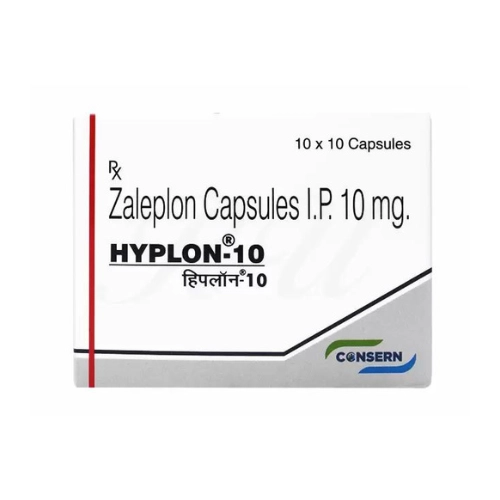Insomnia is one of the most common sleep disorders, affecting millions of individuals worldwide. Characterized by difficulty falling or staying asleep, insomnia can lead to various issues, including daytime fatigue, irritability, and decreased cognitive function. While lifestyle changes and non-medical treatments can help, medications like Zaleplon 10 mg offer an effective solution for those needing more immediate relief. Zaleplon 10 mg is primarily used to treat short-term insomnia, helping individuals fall asleep faster and achieve better quality sleep.
In this article, we will explore Zaleplon 10 mg, how it works, its benefits, proper usage, potential side effects, and how it compares to other sleep aids on the market.
What is Zaleplon 10 mg?
Zaleplon 10 mg is a prescription medication belonging to a class of drugs called non-benzodiazepine sedative-hypnotics, commonly referred to as “Z-drugs.” It is specifically formulated to address sleep onset insomnia, where individuals have trouble falling asleep at the beginning of the night. Zaleplon works by calming the brain and inducing sleep, making it particularly useful for short-term management of sleep disturbances.
Unlike some other sleep medications, Zaleplon has a short half-life (approximately one hour), which means it is quickly eliminated from the body. This fast clearance helps minimize the risk of next-day drowsiness or grogginess, a common issue with other sleep aids.
How Does Zaleplon 10 mg Work?
Zaleplon works by targeting the gamma-aminobutyric acid (GABA) receptors in the brain. GABA is a neurotransmitter that inhibits brain activity, helping to induce relaxation and promote sleep. By enhancing the effects of GABA, Zaleplon helps calm overactive brain activity, making it easier for individuals to fall asleep.
One of Zaleplon’s main advantages is its rapid onset of action. After taking the medication, most users report feeling sleepy within 15 to 30 minutes. This makes it particularly beneficial for people who struggle with sleep latency, or the time it takes to fall asleep. However, Zaleplon is not typically used for individuals who have difficulty staying asleep throughout the night, as its effects are short-lived.
Benefits of Zaleplon 10 mg
Zaleplon 10 mg offers several benefits for individuals suffering from insomnia:
Fast Sleep Induction: Zaleplon acts quickly, typically within 15 to 30 minutes of ingestion. This makes it an ideal option for individuals who struggle with falling asleep but may not experience problems staying asleep.
Short Half-Life: Zaleplon’s short half-life means that the drug is metabolized and cleared from the body rapidly. This reduces the risk of next-day drowsiness or a “hangover” effect, which is a common complaint with other sleep aids.
Minimal Risk of Dependency: While all sedative-hypnotics carry a risk of dependence, Zaleplon has been shown to have a lower potential for addiction compared to traditional benzodiazepines. It is often prescribed for short-term use, typically for a period of one to two weeks.
Improved Sleep Quality: Zaleplon helps improve the overall quality of sleep by reducing the time it takes to fall asleep. While its short duration of action means it may not be ideal for individuals with middle-of-the-night awakenings, it is very effective for helping those who struggle to initiate sleep.
Fewer Cognitive Side Effects: Zaleplon has a lower risk of causing cognitive side effects, such as memory impairment or confusion, compared to some other sleep medications. This is important for individuals who may be sensitive to the cognitive effects of sedatives.
Proper Usage of Zaleplon 10 mg
For those prescribed Zaleplon 10 mg, it is essential to use the medication as directed by a healthcare provider to maximize its benefits and minimize risks. Here are some general guidelines for taking Zaleplon safely:
Take Right Before Bed: Zaleplon should be taken immediately before bedtime, as it works quickly to induce sleep. Ensure you are ready to sleep before taking the medication to avoid being awake while the drug takes effect.
Ensure Adequate Sleep Time: Zaleplon is most effective when taken before at least 4 to 5 hours of sleep. Taking it when you can’t allocate enough sleep time may result in morning grogginess.
Avoid Food: It is recommended to take Zaleplon on an empty stomach, as taking it with or immediately after a meal can slow its absorption and reduce its effectiveness.
Limit Alcohol Consumption: Combining Zaleplon with alcohol can enhance the sedative effects, increasing the risk of drowsiness, dizziness, and impaired coordination. Alcohol should be avoided while using Zaleplon.
Short-Term Use Only: Zaleplon is generally intended for short-term use, typically for 7 to 10 days. Prolonged use can increase the risk of tolerance, where the medication becomes less effective, and dependence, where individuals struggle to sleep without the drug.
Potential Side Effects of Zaleplon 10 mg
Like all medications, Zaleplon 10 mg may cause side effects in some individuals. While many people tolerate the drug well, potential side effects include:
Dizziness: Dizziness is one of the most commonly reported side effects of Zaleplon. This can occur as the medication begins to take effect.
Drowsiness: Although Zaleplon is designed to reduce next-day drowsiness, some individuals may still experience mild grogginess, especially if they do not get enough sleep after taking the medication.
Headache: Some individuals report headaches as a side effect of using Zaleplon.
Amnesia or Memory Problems: In rare cases, individuals may experience short-term memory issues or engage in activities without recalling them later, such as sleepwalking or eating.
Unusual Behaviors: Some people have reported performing activities like driving or cooking while not fully awake after taking Zaleplon. These events are rare but can be dangerous.
If any side effects persist or worsen, it is important to speak with a healthcare provider to determine whether Zaleplon is the best option.
Zaleplon 10 mg vs. Other Sleep Medications
When considering sleep aids, Zaleplon 10 mg is often compared to other common medications, including zolpidem (Ambien) and eszopiclone (Lunesta). Here’s how they differ:
Zaleplon (Sonata): Zaleplon has the shortest half-life among the three, which means it is quickly eliminated from the body. It is effective for people who have difficulty falling asleep but not for maintaining sleep throughout the night.
Zolpidem (Ambien): Zolpidem has a longer duration of action, making it more suitable for individuals who wake up frequently during the night. However, it carries a higher risk of next-day drowsiness and may cause more complex sleep behaviors, such as sleepwalking or driving.
Eszopiclone (Lunesta): Eszopiclone is similar to zolpidem in terms of duration, but it is known for causing a metallic taste in the mouth. Like zolpidem, it helps with both sleep onset and maintenance.
Each of these medications has its strengths and limitations, and the choice depends on the specific sleep issues and individual preferences.
Is Zaleplon 10 mg Right for You?
Zaleplon 10 mg is an effective option for people dealing with short-term insomnia, particularly for those who struggle to fall asleep quickly. Its rapid onset of action and short half-life make it ideal for those who need a sleep aid without experiencing lingering effects the next morning. However, individuals who suffer from chronic insomnia or frequently wake up during the night may benefit from medications with longer durations, such as zolpidem or eszopiclone.
Before starting Zaleplon, it is important to consult with a healthcare provider to determine if it is the best fit for your sleep needs. Zaleplon should always be used as directed and for short-term relief to prevent the development of tolerance or dependence.
Conclusion
Zaleplon 10 mg is a well-established treatment for short-term insomnia, providing fast relief for individuals who have difficulty falling asleep. Its rapid onset, short half-life, and minimal next-day effects make it an attractive option for those seeking quick and effective relief from sleep-onset insomnia. However, like all medications, Zaleplon should be used responsibly and under the guidance of a healthcare provider to ensure safe and effective results. By understanding how Zaleplon works and following proper usage guidelines, individuals can find much-needed relief from their insomnia symptoms and improve their overall sleep quality.












